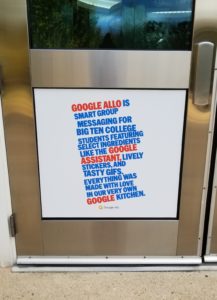 As I was walking into the gym the other day, I noticed something different. There were advertising stickers on the doors to the gym. Google had struck a deal with the University of Maryland to put those stickers on the doors, a place where advertising had not yet appeared. While annoyed that the University is giving companies access to its students for a little extra revenue, I have to admit that this is a good move by Google. The company knows that its main users are students and young professionals. Google also knows that technology early adopters tend to be educated young people, a category that obviously includes college students. Thus, Google is placing ads for its new messaging app, Allo, throughout the Big Ten college campuses.
As I was walking into the gym the other day, I noticed something different. There were advertising stickers on the doors to the gym. Google had struck a deal with the University of Maryland to put those stickers on the doors, a place where advertising had not yet appeared. While annoyed that the University is giving companies access to its students for a little extra revenue, I have to admit that this is a good move by Google. The company knows that its main users are students and young professionals. Google also knows that technology early adopters tend to be educated young people, a category that obviously includes college students. Thus, Google is placing ads for its new messaging app, Allo, throughout the Big Ten college campuses.
What’s the plan?
 Google is attempting to leverage it’s brand equity and high adoption rates of Google Drive and Chrome to jump-start Allo app downloads. One of its promotional banners states “Google Allo is for smart group messaging on Big Ten college campuses featuringselect ingredients like the Google Assistant, lively stickers and tasty gifs. Everything was made with love in our very own Google kitchen”. This banner is clearly invoking the Google brand to signal that it is a product that you already know and trust. It is also mentioning that it would make your life easier by integrating products that you already use.
Google is attempting to leverage it’s brand equity and high adoption rates of Google Drive and Chrome to jump-start Allo app downloads. One of its promotional banners states “Google Allo is for smart group messaging on Big Ten college campuses featuringselect ingredients like the Google Assistant, lively stickers and tasty gifs. Everything was made with love in our very own Google kitchen”. This banner is clearly invoking the Google brand to signal that it is a product that you already know and trust. It is also mentioning that it would make your life easier by integrating products that you already use.
How does this help with long term goals?
This move is a clear attack at its largest domestic competitor, Facebook, who owns Messenger and WhatsApp. Google is trying to steal that market share by making group projects easier through the convenient messaging app. Moreover, it’s an attempt to become more like China’s WeChat. WeChat provides many different services besides its main messaging feature from banking to food delivery services. Thus, it has access to a lot of data. This data allows WeChat to create better algorithms to please consumers and it allows for an inside look into what consumers are looking for in order to remain relevant. Facebook and Google are currently regarded as the two companies that know everything about a large chunk of the American (and world) population. With this Google Allo, the company is simply trying to remain relevant and to continue its gain of Big Data.
Additionally, not only is this a way to promote Allo adoption, this promotion is aimed at increasing the use of the Google Assistant. Notice how “Google Allo”, “Google Assistant” and “Google” are the only ones in red. They are the most important words as they are the ones intended to be left with the viewer. In other words, Google is saying “Hey, remember Google? You trust Google so you should download the Allo and start using the Assistant more.” Here, Google is competing with Apple’s Siri and Samsung’s Bixby. Essentially, this is all a race to get the most data on consumers. More data means more info for algorithms and future innovations. And it’s leaving no room for error. These banners are everywhere in our gym.
What do you think of Google’s strategy? Does it entice you to download the product? If not, what could it do to improve its strategy?

